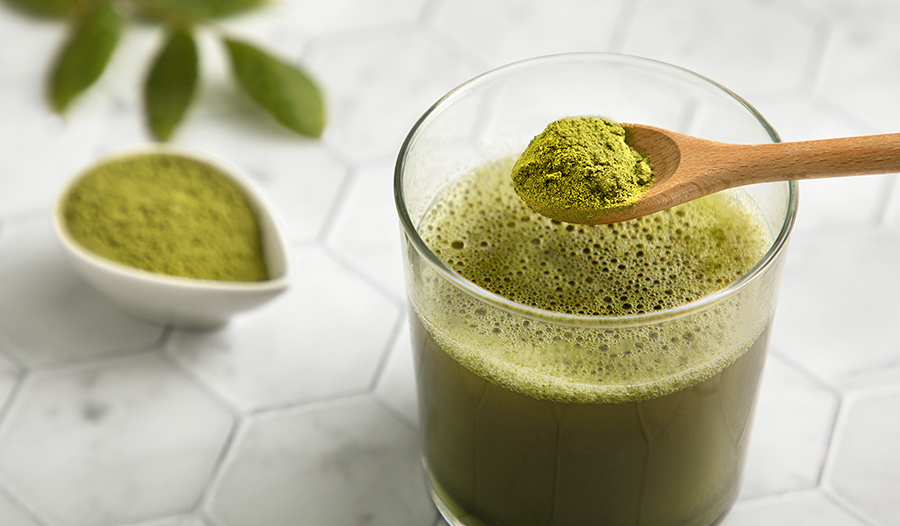5 Health Benefits and Uses of Moringa Tea

What is Moringa?
One of the most popular and beneficial green superfoods is the moringa oleifera, known in popular parlance as “drumstick”, “miracle” or “horseradish” tree. The tree is native to the Himalayan foothills of India but is now commonly cultivated in the semiarid, tropical, and subtropical zones of the world.
The moringa tree has a high nutritive value and each part of it is viable for commercial or nutritional purposes. While the benefits of this tree have become known to the West only in the recent past, moringa has been utilized in and around the Indian subcontinent for centuries. Its prolific nutrient composition made it one of the profound medicinal herbs to be used in traditional Ayurvedic medicine.
With that being said, the tea that is made from ground and dehydrated moringa leaves is undoubtedly one of the most nutritious teas that can be consumed.
Moringa tea is credited with the presence of numerous essential vitamins and minerals. The tree itself, specifically the leaves, pods, and seeds, contain a variety of essential phytochemicals such as tannins and flavonoids, which make their way into the moringa tea once the leaves are ground.
Here are a few important health benefits and uses of moringa tea.
1. Packed With Antioxidants
Moringa tea is full of antioxidants, vitamin C, and beta-carotene. Dr. Amy Shah, double board-certified MD says, “Antioxidants offer a range of health benefits and help in combating and eliminating free radicals in the body, preventing the onset of oxidative stress that can potentially be harmful”.
The leaves of this tree are also rich in quercetin. “Quercetin is an antioxidant that may help to stabilize blood sugar, disarm disease-causing free radicals and help prevent heart disease”, she adds. The leaves also contain chlorogenic acid, which according to research, may help regulate and control blood sugar levels.
2. Contains Anti-inflammatory Compounds
Moringa tea is anti-inflammatory in nature due to the presence of inflammation-fighting agents known as isothiocyanates, which alleviate low-grade inflammation. “Inflammation is a normal response to stimuli in the body, however, chronic inflammation has been shown to lead to a range of health concerns including high blood pressure”, says Dr. Shah. Studies suggest that phenolic glycosides and other compounds in moringa demonstrated immunosuppressive and anti-inflammatory activities.
3. Aids in Digestion
The anti-inflammatory compounds in moringa tea help improve digestion, calming the stomach, and generally improving overall gastrointestinal health. The antibacterial properties of this tea also help your gut function at its optimum state. “Many superfoods, like moringa extract, may help to keep the gut healthy and functioning properly. The high antibiotic and antibacterial properties of moringa may help stop the growth of pathogens in the gut. Additionally, moringa is high in vitamin B, which helps with overall digestion, reducing bloating, constipation and other digestive issues”.
4. Boosts Immune System and Energy
Potent levels of ascorbic acid and other antioxidants make this tea ideal for protecting against symptoms of cold and flu. “These antioxidants stimulate the production of white blood cells that help fight against oxidative stress, thereby helping to strengthen the immune system.”
Moringa tea is also a non-caffeinated energy booster. “Avoiding caffeine and choosing natural energy boosters is ideal at promoting a healthy sleep/wake cycle and keeping circadian rhythms in line”, adds Dr. Shah.
5. Improves Skin and Hair Health
The potent antioxidant properties of moringa boast a high concentration of a chemical termed ‘cytokinins’. This not only helps repair damaged cells but also boosts cell growth and stabilizes collagen. Moringa tea is loaded with proteins as well as all nine essential amino acids and has sufficient quantities of vitamin C and B-complex. “Amino acids are the building blocks of protein, which help to promote hair growth and retain moisture in the skin. Because of this, regular intake of moringa is a great way to improve skin and hair health”, explains Dr. Shah.
References:
- https://www.sciencedirect.com/science/article/pii/S2213453016300362
- https://www.sciencedirect.com/topics/nursing-and-health-professions/phytochemical
- https://pubmed.ncbi.nlm.nih.gov/19324944/
- https://www.ncbi.nlm.nih.gov/pmc/articles/PMC4071966/
- https://arthritis-research.biomedcentral.com/articles/10.1186/s13075-018-1597-9
- https://pubmed.ncbi.nlm.nih.gov/20435128/
- https://pubmed.ncbi.nlm.nih.gov/21771453/
- https://www.britannica.com/science/cytokinin
DISCLAIMER:This Wellness Hub does not intend to provide diagnosis...
















































































 Table of Contents
Table of Contents
















